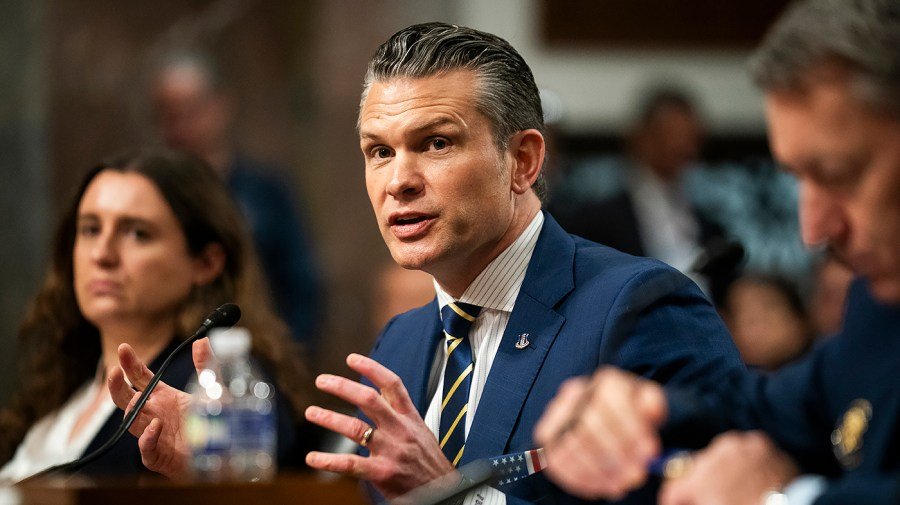
Democratic senators on Wednesday repeatedly slammed Defense Secretary Pete Hegseth over his decision to restore the names of nine military bases originally named after Confederate leaders, with Sen. Tim Kaine (D-Va.) criticizing the Pentagon chief for not calling the families whose relatives’ names will now be stripped from the installations.
The former titles, which the Pentagon earlier this month said would be restored albeit with new namesakes, means seven bases named for notable individuals will soon revert back roughly two years after conversion. Hegseth earlier this year ordered the names of two other bases, Fort Liberty and Fort Moore, changed back to Fort Bragg and Fort Benning.
Kaine, whose state holds three of the nine military bases that were originally named for Confederate generals, said Hegseth’s decision strips away “the names of four amazing people that the Pentagon and local communities had chosen to honor.”
The Virginia bases are currently known as Fort Barfoot, named after Col. Van Barfoot who earned a Medal of Honor for his actions during World War II; Fort Walker, honoring American abolitionist and Civil War surgeon Mary Edwards Walker, the only woman to ever receive a Medal of Honor; and Fort Gregg-Adams, named after Lt. Gen. Arthur Gregg, the first Black man in the Army to reach the rank of lieutenant general, and Lt. Col. Charity Adams Earley, the first Black woman to become an officer in the Women’s Army Auxiliary Corp in WWII.
The base monikers will be restored to Fort Pickett, Fort A.P. Hill and Fort Lee, respectively, all of which originally referred to Confederate generals.
“Why did you decide that these four patriots were not worthy enough to have their names on a base?” Kaine asked Hegseth during a Senate Armed Services Committee hearing.
Hegseth said the change “was never about the names of the bases they were renamed to,” and “not about erasing history,” drawing the ire of Kaine.
“You don’t care about their military record. You wanted to restore the Confederate names,” Kaine said. “When you called the Gregg family to tell them that their dad’s name was no longer going to be on the base, what was their reaction?”
Hegseth said the Army had notified them, causing Kaine to shoot back: “You didn’t call any of the families. I’ve spoken with the families and the families were called by the press. That’s how they learned about this.”
Kaine pressed Hegseth not to issue the orders to change the current names of the bases, which the Pentagon chief refused to do.
“We very much thank and appreciate them for their service, and will find ways to recognize them. But the orders will soon be going to those bases to change the names back to the original name that never should have been changed,” he said.
Later in the hearing, Sen. Angus King (I-Maine) called out Hegseth for the “incredible gymnastics” to find other soldiers with the same last names as the Confederate generals in order to restore the base titles.
“Why are you doing this? I don’t understand what the motivation is to rename bases for people who took up arms against their country on behalf of slavery,” King said. “What possible motivation can there be for this? Who is telling you to do this?”
Hegseth insisted that service members have “a connection to those bases” and said it’s “important for the morale of the Army” to revert back to the former names.
But Sen. Tammy Duckworth (D-Ill.), and Army National Guard veteran, dismissed that argument, pointing to her training at then-Fort Rutger, Ala., which is soon to revert back after being changed to Fort Novosel.
“You said just now to Sen. King, that to a man and to a woman, we would rather be associated with the old Confederate names. Well, I am one of those women,” Duckworth said. “I served at Fort Rucker, Alabama, a base that was named for a traitor who took arms against the United States of America, led troops to kill Americans. It was renamed for Mike Novosel, a Medal of Honor recipient.”
“I’d rather be associated with Mike Novosel than a failed Confederate traitor,” she added. “I don’t know whether you were inexperienced or too incompetent, but I wonder when you were actually focused on our nation’s war-fighting mission.”
Sen. Tom Cotton (R-Ark.) praised Hegseth for renaming the Army bases, blaming the changes, which were Congressionally mandated in 2021 and took effect in 2023, on “a Jacobin fever” that swept the country in 2020 following the nationwide civil unrest prompted by the murder of George Floyd in Minneapolis.
“It teaches a new generation of soldiers about those who went before them, and I hope the matter is settled,” Cotton said.
The base changes will solidify a campaign promise made by President Trump, who vowed to revert bases back after a congressionally mandated commission recommended new titles in 2022.


